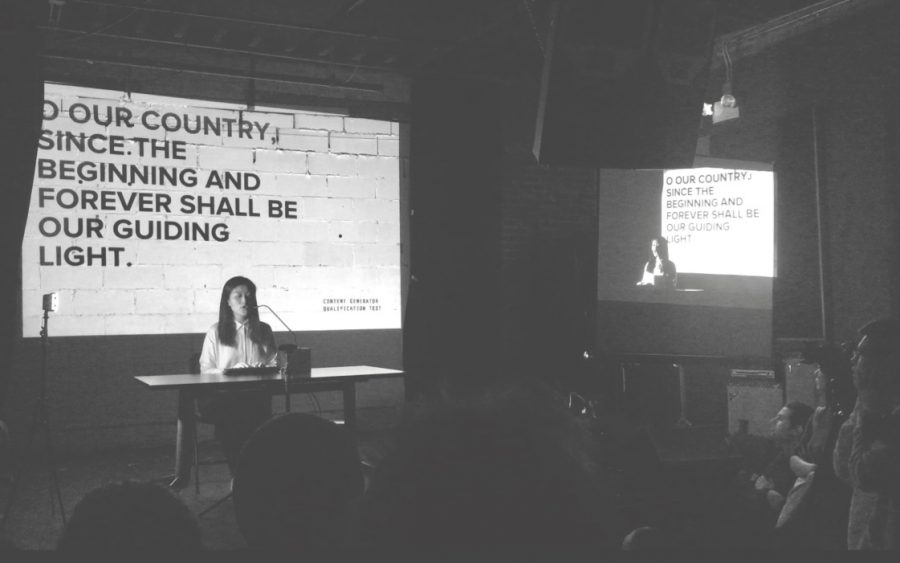Type to Erase. Repeat to Forget. (2018)
In the interactive installation “Type to Erase. Repeat to Forget,” Wang plays with the concepts of juxtaposition and contrast by reversing everyday tasks. During the first part of the experience, “Type to Erase,” the user sits in front of a computer screen that has a sentence written across it in white. As you type out the words of the sentence on the keyboard, rather than generating new words, the sentence starts to disappear.
During the second part of the installation, “Repeat to Forget,” viewers are invited to stand in front of a microphone set up next to a television screen. On the screen, there are phrases written in black lettering — taken from the same text used in part one — and as the phrases are correctly spoken into the microphone, they disappear from the screen. Through the process of speaking and interacting with the speech recognition system that judges the viewer’s pronunciation, the meaning of some of the words are redefined until they become mere syllables. This installation was presented as part of NYU’s 2018 Interactive Telecommunications Program Winter Show.

Wang, dressed in all white, speaks in front of an audience for “The System,” a performance piece in which she enacts a test to determine her fate in a futuristic world. (Courtesy of Carrie Sijia Wang)
The System (live performance, 2018)
In her performance of “The System,” Wang invites the audience to a futuristic, fictional world where they watch her as she tries to pass a Content Generator Qualification Test. Wang sits on stage, dressed in a white sweatshirt and white gloves, going through the motions of the long and complicated test. It’s meant to determine her fate as a content generator, a low-level government clerk position at the Office of Content Generation.
The test involves three parts: content generation, integration reinforcement and subject realignment. Looping between each section, the test gets more intense with each new cycle. During the first part, content generation, Wang is asked to type as fast as she can during a limited amount of time, and the text used for this step is sourced from a collection of destination descriptions on international tourism websites. For the next step — integration reinforcement — Wang recites slogans made from a combination of lyrics from different national anthems, as lead by a computer voice. The texts for both steps are Markov chain-generated, which is a similar method used in speech prediction and translation. At the end of each performance, Wang, candidate 3752, ultimately passes the test.

A viewer takes part in the second part of the installation, “Repeat to Forget,” where they say out loud the phrases they see on screen only to watch them disappear seconds later. (Courtesy of Carrie Sijia Wang)
ALEX, Your Best Friend at Work (2019)
During this participatory experience, Wang creates a futuristic world reminiscent of “1984,” in which an artificial intelligence system called ALEX knows everything about her. The performance follows a linear narrative. At the beginning, Wang gets caught on camera crying in a stairwell while at work. Because crying is a behavior deemed “out of range,” Wang has to go see ALEX for a one-on-one session, which includes conversation, data collection, facial expression analysis and speech analysis.
For ALEX, everything is technical, and all of Wang’s emotions are rationalized and translated into data used to determine the root cause of Wang’s “out of range” emotions. Wang’s character goes through the motions of the simulation with a straight face, void of expression. The only time her character shows “out of range” emotions is when she cries in the staircase.
After the performance, which presents this interaction between Wang and ALEX, the audience is invited to engage in the participatory experience. Three at a time, audience members go into an office space, where ALEX 2.0 is loaded on three separate computers. There, according to the description of Wang’s website, “the participants are asked to give up their free will and follow ALEX’s suggestions for 10 minutes.”

Presenting ALEX, an artificial intelligence system that Wang interacts with in a live performance as if it were her therapist. ALEX records her emotions and translates them into data to analyze her emotions. (Courtesy of Carrie Sijia Wang)
Email Madeleine Lyskawa at [email protected].

























































































































































